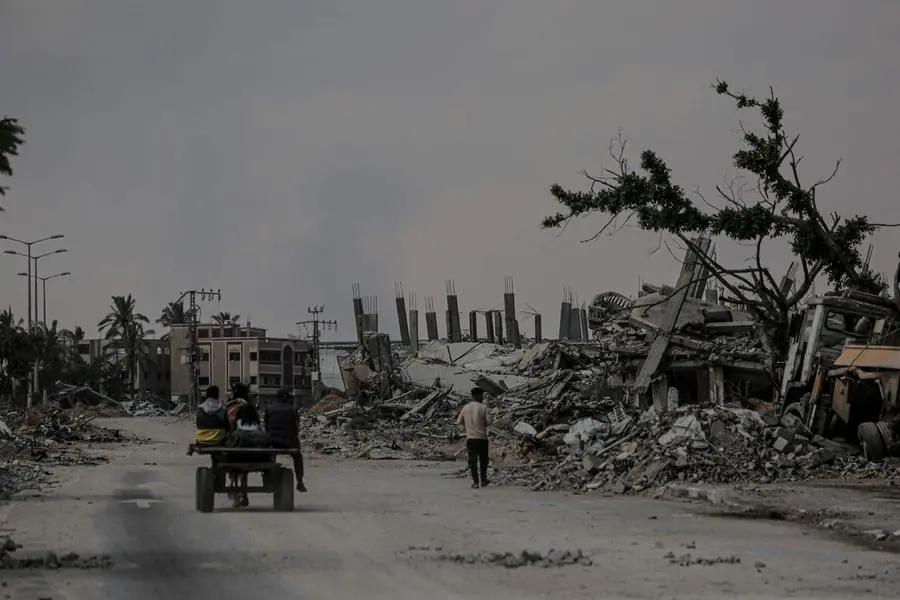PHOTO
Hamas on Friday said it "considers positively" an Israeli roadmap towards a full Gaza ceasefire announced by US President Joe Biden, who urged an end to the almost eight-month war.
But swiftly afterwards, Israeli Prime Minister Benjamin Netanyahu poured cold water on Biden's talk of peace, insisting the army would continue fighting until it had "eliminated" Hamas's capacity to rule Gaza and pose a military threat.
Biden's address came as Israeli troops pushed into central Rafah, escalating the war with Hamas despite international objections to any assault on the southern Gaza city.
Outlining how the war might end, Biden said Israel's three-stage offer would begin with a six-week phase that would see Israeli forces withdraw from all populated areas of Gaza.
It would also see the "release of a number of hostages, including women, the elderly, the wounded, in exchange for (the) release of hundreds of Palestinian prisoners".
Israel and the Palestinians would then negotiate during those six weeks for a lasting ceasefire -- but the truce would continue while the talks remained underway, Biden said.
The US president urged Hamas to accept the Israeli offer. "It's time for this war to end, for the day after to begin," he said, in comments echoed by British Foreign Secretary David Cameron.
Hamas in a statement on Friday evening said it "considers positively" Biden's speech regarding "a permanent ceasefire, the withdrawal of Israeli forces from Gaza, reconstruction and the exchange of prisoners".
UN chief Antonio Guterres "strongly hopes" the latest development "will lead to an agreement by the parties for lasting peace", his spokesman Stephane Dujarric said.
German Foreign Minister Annalena Baerbock said the Israeli offer "provides a glimpse of hope and a possible path out of the war's deadlock", while EU chief Ursula von der Leyen welcomed a "balanced and realistic" approach to end the bloodshed.
- Israel insists on war aims -
But Netanyahu took issue with Biden's presentation of what was on the table, insisting the transition from one stage to the next in the proposed roadmap was "conditional" and crafted to allow Israel to maintain its war aims.
"The prime minister authorised the negotiating team to present an outline for achieving (the return of hostages), while insisting that the war will not end until all of its goals are achieved," Netanyahu's office said in a statement.
Those aims include "the return of all our hostages and the elimination of Hamas's military and governmental capabilities", it added.
"The exact outline proposed by Israel, including the conditional transition from stage to stage, allows Israel to maintain these principles."
Hamas has been careful about commenting on ceasefire proposals put to it by Egyptian, Qatari or US mediators. It accepted one earlier this year only for it to be disavowed by Israel.
Earlier on Friday, Hamas leader Ismail Haniyeh accused Israel of "using negotiations as a cover to continue its aggression", saying Hamas "refuses to be a part of these manoeuvres".
Israel has repeatedly vowed to destroy Hamas since the Palestinian militant group attacked southern Israel on October 7.
Israel sent tanks and troops into Rafah in early May, ignoring concerns over the safety of displaced Palestinian civilians sheltering in the city on the Egyptian border.
On Friday, soldiers were operating in the city centre where they uncovered rocket launchers and tunnel shafts and dismantled a Hamas weapons storage facility, the army said.
- Blinken says aid situation 'dire' -
A stream of civilians has flooded out of Rafah, taking their belongings on their shoulders, in cars or on donkey-drawn carts.
Before the Rafah offensive began, the United Nations said up to 1.4 million people were sheltering in the city.
Since then, one million have fled the area, the UN agency for Palestinian refugees, UNRWA, has said.
The Israeli seizure of the Rafah crossing has further slowed sporadic deliveries of aid for Gaza's 2.4 million people and effectively shuttered the territory's main exit point.
Israel said at the weekend that aid deliveries had been stepped up.
But US Secretary of State Antony Blinken acknowledged Friday that the humanitarian situation was "dire" despite US efforts to bring in more assistance.
The World Food Programme said daily life had become "apocalyptic" in parts of southern Gaza since Israel began its assault on Rafah in early May.
Jordan announced it will host a summit on June 11, jointly organised with Egypt and the United Nations, bringing together aid agency chiefs and heads of donor governments to discuss the humanitarian response.
- 'Everything is ashes' -
The Gaza war was sparked by Hamas's unprecedented October 7 attack on southern Israel, which resulted in the deaths of 1,189 people, mostly civilians, according to an AFP tally based on Israeli official figures.
Militants also took 252 hostages, 121 of whom remain in Gaza, including 37 the army says are dead.
Israel's retaliatory offensive has killed at least 36,284 people in Gaza, mostly civilians, according to the Hamas-run territory's health ministry.
A medical official at Al-Aqsa Martyrs Hospital in central Gaza's Deir al-Balah said eight people, including two children, were killed in an air strike that hit a house in Al-Bureij refugee camp.
Another source at Nuseirat's Al-Awda Hospital reported three deaths in a strike on a car.
In northern Gaza, witnesses said that after carrying out a three-week operation in the town of Jabalia and its neighbouring refugee camp, troops had ordered residents of nearby Beit Hanoun to evacuate ahead of an imminent assault.
The Israeli army said troops "completed their mission in eastern Jabalia and began preparation for continued operations in the Gaza Strip".
Jabalia shopkeeper Belal al-Kahlot said there was nothing left of his store after the Israeli operation. "Everything is ashes."
The Israeli military announced the deaths of two soldiers in Gaza, taking to 294 the number of Israeli troops killed since the start of ground operations in late October.





















